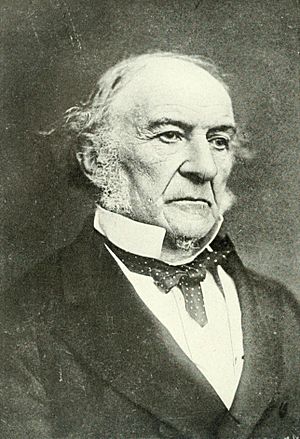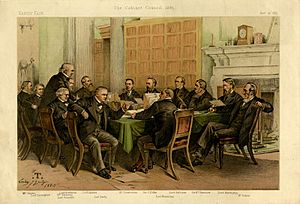Premierships of William Ewart Gladstone facts for kids
Quick facts for kids  |
|
| Premierships of William Ewart Gladstone | |
|
Monarch
|
|
|---|---|
|
William Ewart Gladstone
|
|
| Party | Liberal |
| Seat | 10 Downing Street |
|
First term 3 December 1868 – 17 February 1874 |
|
| Cabinet | First Gladstone ministry |
| Election | 1868 |
|
|
|
|
Second term 23 April 1880 – 9 June 1885 |
|
| Cabinet | Second Gladstone ministry |
| Election | 1880 |
|
|
|
|
Third term 1 February 1886 – 20 July 1886 |
|
| Cabinet | Third Gladstone ministry |
| Election | 1885 |
|
|
|
|
Fourth term 15 August 1892 – 2 March 1894 |
|
| Cabinet | Fourth Gladstone ministry |
| Election | 1892 |
|
|
|
|
|
|
William Ewart Gladstone was a very important leader in the United Kingdom of Great Britain and Ireland. He served as the Prime Minister four times between 1868 and 1894. He belonged to the Liberal Party.
Gladstone was known for his strong moral beliefs. He focused on keeping the world peaceful and managing money carefully. He also worked to make political systems fairer. A big challenge for him was the "Irish question", which was about how Ireland should be governed. Gladstone believed he had an important mission to lead the country. He often tried to get public support for his ideas through elections. His strong approach sometimes caused disagreements within his own Liberal Party. Eventually, he even split his party over the issue of Irish Home Rule, which meant giving Ireland more control over its own affairs.
Contents
Gladstone's First Government (1868–1874)
In late 1867, the previous Liberal leader, Earl Russell, decided to step down. Gladstone then became the new leader of the Liberal Party. In the election of 1868, the Liberal Party won by a large number of seats. This was the first election where more people could vote, thanks to the Reform Act 1867.
As Prime Minister, Gladstone led a Liberal Party that was a mix of different groups. These included people like him (called Peelites), traditional Liberals (Whigs), and those who wanted big changes (radicals). Gladstone's main goals were "peace, economy, and reform."
Between 1870 and 1874, disagreements about religion caused problems for the Liberal Party. Debates over schools and the role of the church in Ireland created divisions. Some wanted the government to control education and promote a general Christian faith. Others, like Gladstone, wanted religion to be more independent from the government. These disagreements made it hard for the party to agree on future plans for education and Ireland.
Key Laws and Changes
Gladstone's government made many important changes. One of the first was the Irish Church Act 1869. This law removed the special status of the Church of Ireland, meaning it was no longer the official state church in Ireland.
Next, the Landlord and Tenant Act of 1870 tried to help Irish farmers. It aimed to protect them from unfair landlords. The law made it harder for landlords to evict tenants without a good reason. It also offered money to tenants if they were unfairly evicted.
The Elementary Education Act 1870 was a huge step for education in England. For the first time, it created a proper system of elementary schools. New "school boards" were set up to build schools and hire teachers where needed. These boards could also make sure children attended school if they weren't getting an education elsewhere.
In 1871, the Trade Union Act made it legal for workers to form trade unions. These unions helped workers get better pay and conditions. However, protesting by "picketing" (standing outside a workplace) was still against the law. The Ballot Act 1872 was also passed, making elections fairer by introducing secret ballots. This meant people could vote without anyone knowing who they chose.
The Licensing Act 1872 changed the rules for pubs. It limited how long pubs could stay open. It also gave local areas the power to decide their own pub opening hours. This law was not popular and caused some protests. Many in the alcohol industry, who used to support the Liberals, now switched to supporting the Conservative Party. Gladstone later felt this law contributed to his party losing the 1874 election.
The Supreme Court of Judicature Act 1873 changed the English court system. It created the High Court of Justice and the Court of Appeal. This made the legal system more modern.
Army Reforms
Gladstone's government also reformed the British Army. These changes, known as the Cardwell Reforms, were led by his War Secretary, Edward Cardwell. The reforms aimed to make the army more efficient and fair.
One big change was ending the system where officers bought their positions. Before, rich families could buy ranks, meaning talent wasn't always rewarded. Cardwell wanted officers to be promoted based on skill, not wealth. This idea was very popular with the public. The reforms also shortened the time soldiers had to serve. This created a larger group of trained reserve soldiers who could be called upon if needed.
Managing the Nation's Money
Gladstone was very focused on careful spending. His government worked to reduce how much the country spent. From 1868 to 1871, national spending went down. This allowed Gladstone to have extra money (surpluses) each year. He also managed to lower the income tax for people. He even suggested getting rid of income tax completely if his party won the next election.
Foreign Relations
After the Franco-Prussian War (1870–71), Gladstone tried to convince Germany not to take land from France. He published an article about his views, but Germany did not agree.
During the American Civil War (1861-1865), Gladstone had supported Britain and France helping the Southern states. However, the Prime Minister disagreed, and Britain stayed neutral. Later, in 1872, Gladstone helped settle a dispute with the United States. Britain paid money for damages caused by a Confederate ship, the CSS Alabama, which had been built in an English port.
Gladstone's Second Government (1880–1885)
In the 1880 election, Gladstone's Liberal Party won many more seats. Even though he was getting older, Gladstone was a very energetic leader and a brilliant speaker. However, his party was starting to divide into different groups.
One of the first important laws passed by this government was the Elementary Education Act 1880. This law made it compulsory for all children aged 5 to 10 to attend school.
In 1881, Gladstone believed that to pass new laws for Ireland, order needed to be restored. His government passed a law that allowed the Viceroy of Ireland to arrest people without trial. This law was used to arrest the Irish leader Charles Stewart Parnell. Later that year, the Land Law (Ireland) Act 1881 was passed. This law gave Irish tenants important rights, including fair rent and security in their homes.
The Married Women's Property Act 1882 was a very important step for women's rights. It gave married women the same rights as unmarried women to buy, sell, and own property. This meant that for the first time, married women were legally recognized as individuals with their own property rights.
Gladstone's second government also made changes to elections. The Corrupt and Illegal Practices Prevention Act 1883 aimed to stop corruption in elections. The Representation of the People Act 1884 gave more men the right to vote. About six million more people could now vote in parliamentary elections.
Foreign Relations and Challenges
When Gladstone was not in power, he often spoke out against aggressive expansion of the British Empire. He believed in a world where countries followed laws and protected weaker nations. When he returned to office, he wanted to bring back these principles. However, public opinion sometimes pushed his government to continue expanding the empire, especially in Egypt.
Gladstone had won the 1880 election partly by opposing the previous government's support for the Ottoman Empire. He then changed some of the previous foreign policies. For example, he withdrew British troops from Afghanistan.
However, in 1882, a nationalist uprising happened in Egypt. This worried Britain because of the Suez Canal, which was vital for trade routes to India. Gladstone tried to get other European countries to act together, but they were not keen. So, Britain acted alone. The Royal Navy attacked the city of Alexandria, and British troops later defeated the rebels. This led to Britain taking control of Egypt.
Another challenge came in Sudan. In 1884, Gladstone sent General Gordon to Sudan to help evacuate Egyptian soldiers. Gordon decided to try and hold the capital, Khartoum, instead. Gladstone was slow to send help, and Gordon was killed when Khartoum fell. This event made Gladstone very unpopular.
Gladstone's Third Government (1886)
After the 1885 election, Gladstone formed a new government in February 1886. He was quite old by this point. He focused on the issue of Irish Home Rule.
Gladstone introduced the First Home Rule Bill to Parliament. This bill would have given Ireland its own parliament and more control over its affairs. He also proposed a Land Purchase Bill, which would have helped Irish farmers buy land from their landlords.
However, these bills caused a major split in the Liberal Party. Many Liberals, including some of Gladstone's own ministers, disagreed with his plans. The Land Purchase Bill was criticized from all sides and was dropped. The Home Rule Bill was defeated in Parliament, with many Liberals voting against it.
Because of this defeat, Gladstone called another election. This election resulted in a big victory for the parties that opposed Home Rule. The Liberal Party was permanently divided over this issue.
Gladstone's Fourth Government (1892–1894)
The 1892 election did not give any party a clear majority. However, Gladstone became Prime Minister for the last time at the age of 82. He was the oldest person ever to become Prime Minister and the oldest to hold the office when he resigned in 1894 at 84.
Gladstone made a new rule for his ministers: they had to resign from any company directorships. This was to avoid conflicts of interest. This rule was later adopted by future governments.
Because he needed the support of Irish politicians, Gladstone introduced the Second Home Rule Bill in 1893. This bill passed in the House of Commons. However, the House of Lords (the upper house of Parliament) voted overwhelmingly against it. Gladstone wanted to call another election to challenge the Lords, but his colleagues convinced him not to.
Gladstone decided to resign as Prime Minister on March 2, 1894, saying it was for health reasons. He was a truly remarkable figure in British history, serving his country for many decades.
|
 | Selma Burke |
 | Pauline Powell Burns |
 | Frederick J. Brown |
 | Robert Blackburn |



